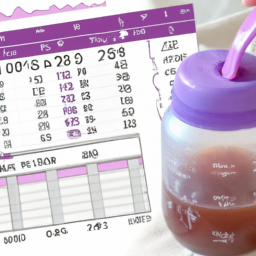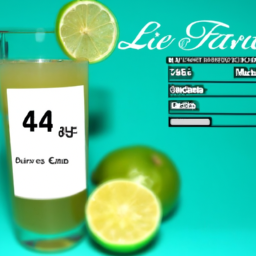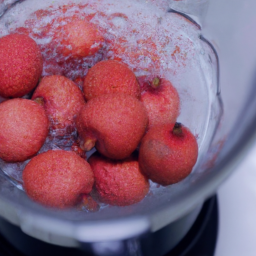For new parents, it can be concerning to observe your baby struggling with constipation. While there are different remedies available, prune juice is often recommended for its natural laxative properties. However, it is important to know the correct dosage of prune juice for your infant in order to avoid any potential risks or discomfort.
Before giving prune juice to your baby, it’s crucial to understand the age restrictions and signs of constipation in infants. Additionally, you should be aware of the benefits and proper dosage of prune juice for relieving constipation, as well as how to prepare and administer it safely.
This article will provide you with all the information you need to make an informed decision about using prune juice to help your baby’s bowel movements.
Key Takeaways
- Prune juice can be introduced to babies between 6 and 8 months but consult with a pediatrician first.
- Dilute prune juice with water in a 1:1 ratio to make it easier for babies to digest.
- The recommended dosage for prune juice is 1-2 ounces per day, gradually increasing over time.
- Prune juice should not be used as a long-term solution for constipation as it may lead to dependence and negative effects on the baby’s digestive system.
Age Restrictions for Giving Prune Juice to Babies
Don’t give your baby prune juice before they’re six months old – it could cause some serious tummy troubles! While prune juice is known for its laxative properties, it’s important to remember that infants have delicate digestive systems that may not be able to handle certain foods. Possible risks such as diarrhea, gas, and stomach cramps can arise if you introduce prune juice too early.
Pediatrician advice suggests that breast milk or formula should be the primary sources of nutrition for infants up to six months old. If your baby is experiencing constipation, there are alternative options such as natural remedies like gently massaging their tummy or giving them a warm bath.
Prune juice can be introduced in small amounts between six and eight months, but it’s important to consult with your pediatrician first. By waiting until your baby is old enough, you can help reduce the risk of digestive issues and ensure their overall health and well-being.
It’s important to be aware of the signs of constipation in infants, such as infrequent bowel movements, hard stools, and discomfort during bowel movements. If you notice any of these symptoms, it’s important to address them promptly to prevent further discomfort or complications.
Signs of Constipation in Infants
If your little one seems to be having trouble passing stool, there are a few signs of constipation in infants to look out for. Some common signs include infrequent bowel movements, hard and dry stools, straining during bowel movements, and discomfort or pain when passing stools. It’s important to note that breastfed babies may have less frequent bowel movements than formula-fed babies, but as long as the stool is soft and easy to pass, it is not considered constipation.
Infant diet and hydration play a crucial role in bowel movement regularity. Breast milk or formula provides the necessary fluids for infants, but if your baby has started solid foods, make sure they are getting plenty of water as well. Some home remedies for constipation in babies include massaging their tummy, giving a warm bath, and bicycle leg movements. It’s important to consult with your pediatrician before trying any home remedies or medications. Now, let’s explore the benefits of prune juice for relieving constipation.
Benefits of Prune Juice for Relieving Constipation
One effective remedy for constipation in infants is drinking prune juice, which has been likened to a natural laxative that can help soften and move stool through the digestive system. Prune juice contains sorbitol, a sugar alcohol that draws water into the large intestine, making stool softer and easier to pass. Additionally, the fiber content in prune juice helps promote bowel movement and regularity.
While prune juice is a popular choice for relieving constipation in infants, there are other alternatives that can be considered. These include increasing the baby’s water intake, introducing high-fiber foods, and using glycerin suppositories. It is important to note that using prune juice as a long-term solution for constipation may lead to dependence and can have negative effects on the baby’s digestive system. Therefore, it’s recommended to consult with a pediatrician before making any changes to the baby’s diet.
Moving on to preparing prune juice for your baby, there are a few important steps to follow.
Preparing Prune Juice for Your Baby
When preparing prune juice for my baby, there are a few important things to keep in mind. First, I need to choose the right type of prune juice, making sure it’s unsweetened and doesn’t contain any additives or preservatives.
Second, I should dilute the juice with water to make it easier for my baby to digest.
Finally, it’s important to test for any allergies or intolerances by introducing the juice slowly and watching for any adverse reactions.
Choosing the Right Type of Prune Juice
To choose the right prune juice for your baby, you should look for a brand that’s labeled as 100% juice and free from added sugars or sweeteners. When it comes to the type of prune juice, it’s best to opt for organic options as they’re free from harmful pesticides and chemicals.
Additionally, consider the following factors when selecting a brand:
- Check the expiry date to ensure freshness
- Look for brands that use high-quality prunes
- Choose brands that are pasteurized to eliminate harmful bacteria
- Read reviews or ask for recommendations from other parents
It’s important to keep in mind that not all babies may tolerate prune juice well, so it’s best to start with a small amount and observe any adverse reactions. Once you’ve found the right brand, you can move on to diluting it with water to make it safe and appropriate for your baby’s age and digestive system.
Diluting with Water
Now that you’ve chosen the right type of prune juice for your baby, the next step is to dilute it with water. It’s important to note that pure prune juice can be too strong for your baby’s digestive system and may cause stomach discomfort or diarrhea.
Diluting the juice with water can help your baby’s body adjust to the new food and prevent any potential negative reactions. When it comes to dilution, it’s recommended to use a 1:1 ratio of prune juice to water.
However, some parents may find that their baby still experiences discomfort with this ratio. In this case, there are alternatives to water that can be used for dilution, such as apple juice or pear juice. These juices also have natural sugars that can help improve the taste and make the juice more palatable for your baby.
It’s important to note that diluting prune juice doesn’t only help prevent discomfort and negative reactions, but it also has benefits for your baby’s overall health. Dilution can help your baby stay hydrated, which is important for maintaining proper bowel movements and preventing constipation. Additionally, diluting the juice can also help your baby absorb more nutrients from the juice, which can aid in their growth and development.
Transitioning into the subsequent section about testing for allergies or intolerances, it’s important to be aware of any potential negative reactions your baby may have to the juice, even if it has been diluted. It’s recommended to start with small amounts and gradually increase the amount of juice as your baby’s body adjusts.
Keep an eye out for any signs of discomfort or negative reactions, and if you have any concerns, consult with your pediatrician.
Testing for Allergies or Intolerances
Before you start introducing new foods to your little one, it’s crucial to test for any allergies or intolerances they may have. Allergy testing can be done through a skin prick test or a blood test, while intolerance symptoms may include diarrhea, vomiting, and fussiness. It’s important to keep in mind that even if your child hasn’t shown any signs of allergies or intolerances before, they can still develop them as they try new foods.
If you suspect that your child may have an allergy or intolerance to prune juice, it’s best to introduce it slowly and in small amounts. Start with a teaspoon or two mixed with water and observe how your baby reacts. If there are no negative symptoms, gradually increase the amount over time.
It’s also important to consult with your pediatrician before introducing prune juice or any new foods to your baby’s diet.
In the next section, we’ll discuss the recommended dosage for giving prune juice to babies.
Recommended Dosage for Giving Prune Juice to Babies
The recommended dosage for giving prune juice to babies is important to keep in mind for their digestive health. According to the American Academy of Pediatrics, babies under the age of 6 months shouldn’t be given any juice, including prune juice. This is because juice doesn’t provide any nutritional value for infants and can potentially cause diarrhea or other digestive issues.
For babies over 6 months old, it’s recommended to start with a small amount of prune juice, around 1-2 ounces per day. It’s important to gradually increase the amount over time and monitor for any digestive discomfort or changes in bowel movements. Additionally, it’s recommended to dilute the prune juice with water, using a ratio of 1 part juice to 3 parts water.
When it comes to administering prune juice to your baby, it’s important to offer it in a cup or bottle, rather than a feeding bottle. This is because prolonged exposure to juice can lead to tooth decay. It’s also recommended to offer prune juice in between meals, rather than during a feeding, to avoid interfering with their appetite.
How to Administer Prune Juice to Your Baby
When administering prune juice to my baby, I prefer using a bottle or cup. I find that using a bottle with a nipple or a sippy cup makes it easier for my baby to drink the juice.
Additionally, I usually offer prune juice alongside solid foods to help prevent constipation.
Using a Bottle or Cup
Pouring prune juice into a playful plastic cup for your precious little one is a perfect way to provide proper hydration. Using a cup instead of a bottle can help your baby learn how to drink from a cup and promote healthy oral development. When introducing prune juice to your baby, it is important to wait until they are at least 4-6 months old and have started eating solid foods. This will help ensure that their digestive system is mature enough to handle the juice.
When offering prune juice to your baby, it is important to keep track of how much they are drinking. Too much prune juice can cause diarrhea, which can lead to dehydration. A good rule of thumb is to start with 1-2 ounces of prune juice per day and gradually increase the amount as your baby gets used to it. The table below provides a guide for how much prune juice to give your baby based on their age and weight.
| Age | Weight | Amount of Prune Juice |
|---|---|---|
| 4-6 months | 6-8 kg (13-18 lbs) | 1-2 ounces per day |
| 6-8 months | 8-9 kg (18-20 lbs) | 2-3 ounces per day |
| 8-10 months | 9-10 kg (20-22 lbs) | 3-4 ounces per day |
| 10-12 months | 10-11 kg (22-24 lbs) | 4-5 ounces per day |
Offering prune juice alongside solid foods can help regulate your baby’s bowel movements and prevent constipation. It is important to remember that prune juice should not be used as a replacement for breast milk or formula, but rather as a supplement to a balanced diet. As always, consult with your pediatrician before introducing any new foods or beverages to your baby’s diet.
Offering Alongside Solid Foods
Now that you know how to offer prune juice to your baby using a bottle or cup, you may want to consider offering it alongside solid foods. This can be a great way to introduce your baby to new flavors and textures while also promoting healthy digestion.
When combining prune juice with solid foods, you can mix it with breastmilk or offer it alongside purees. This can help to mask the taste of the prune juice and make it more palatable for your baby. As with any new food, it’s important to introduce prune juice slowly and monitor your baby for any adverse reactions.
As you begin to offer prune juice alongside solid foods, it’s important to pay attention to your baby’s bowel movements. This can help you to determine whether you’re offering the right amount of prune juice and whether it’s having the desired effect on your baby’s digestion.
Monitoring Your Baby’s Bowel Movements
As a parent, it’s important for me to monitor my baby’s bowel movements. This is especially true after introducing prune juice to their diet. I should expect changes in both the frequency and consistency of their stools. While prune juice can be effective in relieving constipation, I should also watch out for any negative side effects such as diarrhea or stomach discomfort.
Expected Changes in Frequency and Consistency
By the time your baby starts drinking prune juice regularly, you’ll notice a significant increase in the number of dirty diapers they produce, and the consistency of their poop will become softer and easier to pass. This is because prune juice is a natural laxative that can help regulate your baby’s bowel movements. As a result, their stool frequency will increase, and you may notice changes in the color and consistency of their poop.
It’s important to monitor these changes and discuss any concerns with your pediatrician to ensure your baby’s health and wellbeing. As your baby’s digestive system adjusts to the prune juice, you may notice some changes in their bowel movements that are normal and expected. However, it’s also essential to keep an eye out for any negative side effects, such as diarrhea or dehydration, which can occur if your baby is consuming too much prune juice.
Monitoring your baby’s bowel movements and staying in close communication with your pediatrician will help you identify any potential issues and ensure that your baby is getting the right amount of prune juice.
Identifying Any Negative Side Effects
Keep an eye out for any negative effects, such as diarrhea or dehydration, that could occur if your little one consumes too much prune juice. While prune juice can help relieve constipation, it is still important to ensure that you are giving your baby the appropriate amount. Possible reactions to prune juice overdose include stomach cramps, bloating, and diarrhea. In severe cases, dehydration can occur if your baby loses too much fluid through diarrhea.
To avoid any negative effects, it is recommended that you only give your baby a small amount of prune juice, starting with one ounce per day and gradually increasing if necessary. It is also important to make sure your baby is getting enough fluids, such as breast milk or formula, to avoid dehydration. If you notice any negative reactions or if your baby’s constipation persists, speak with your pediatrician to discuss other remedies for relieving constipation in babies.
Other Remedies for Relieving Constipation in Babies
If prune juice isn’t working, there are other remedies available to help relieve your baby’s constipation. One option is baby massage. Gently massaging your baby’s tummy in a clockwise direction can help stimulate bowel movements.
You can also try rubbing your baby’s back or gently bicycling their legs to encourage the movement of stool through their intestines. Another option is dietary changes.
If your baby is formula-fed, you may want to try switching to a different formula that contains prebiotics or probiotics, which can help regulate bowel movements. If your baby is eating solid foods, try offering high fiber foods like prunes, pears, and peas.
Make sure your baby is getting enough water as well, as dehydration can contribute to constipation. It’s important to keep in mind that not all remedies will work for every baby, and consulting with your pediatrician is always recommended.
In the next section, we will discuss some precautions and risks to consider when giving your baby prune juice or other remedies for constipation.
Precautions and Risks to Consider
Before trying any remedies for your little one’s constipation, it’s important to be aware of the potential risks and precautions to ensure their safety and wellbeing. While prune juice can be an effective natural remedy for constipation in babies, it’s important to note that giving too much can lead to possible complications such as diarrhea, dehydration, and abdominal pain. It’s recommended to start with a small amount and gradually increase the dosage as needed, while closely monitoring your baby’s bowel movements and overall health.
In addition to using prune juice, there are other alternative treatments and natural remedies that can also be helpful in relieving constipation in babies. These include increasing fiber intake through foods such as pureed prunes, pears, and peas, as well as massaging your baby’s belly and providing plenty of hydration through breastmilk, formula, or water. It’s always important to consult with your pediatrician before trying any new remedies or treatments, especially if your baby is experiencing severe constipation or has any underlying medical conditions. By taking the necessary precautions and seeking medical consultation when needed, you can help your little one find relief from constipation in a safe and effective way.
Frequently Asked Questions
Can prune juice cause any negative side effects in babies?
I have researched and found that prune juice benefits babies by relieving constipation. However, excessive intake may cause diarrhea. Alternatives like apple or pear juice can also help. Consult a pediatrician before giving any juice to babies.
Is it safe to give prune juice to a baby who is exclusively breastfed?
As a healthcare professional, I would advise against giving prune juice to a baby who is exclusively breastfed without consulting a pediatrician. Breastfeeding concerns and alternative remedies should be discussed with a healthcare provider to ensure the safety and well-being of the baby.
How long should I wait to see results after giving my baby prune juice for constipation?
I gave my baby prune juice for constipation and noticed results within 24 hours. However, timeline expectations may vary. Alternative remedies, such as increased water intake and fiber-rich foods, can also aid in relieving constipation.
Can I mix prune juice with other liquids or foods for my baby?
I recommend mixing prune juice with water or pureed fruits like apples or pears. This can make the flavor more palatable for your baby. It’s important to introduce new foods slowly and watch for any signs of allergic reactions.
How often should I give my baby prune juice for constipation relief?
Based on my research, frequency recommendation for prune juice varies depending on the age of the baby. For infants under 6 months old, it’s best to avoid prune juice. For those 6 months and older, 1-2 ounces per day is recommended for constipation relief.
Conclusion
As a new parent, I was hesitant about giving my baby prune juice to relieve constipation. However, after researching and consulting with my pediatrician, I learned that prune juice can be a safe and effective remedy.
It’s important to note that there are age restrictions and recommended dosages for giving prune juice to babies. It’s also crucial to monitor your baby’s bowel movements and consider other remedies if necessary.
Giving prune juice to your baby is like planting a seed in a garden. With the right care and attention, it can grow into a healthy and fruitful plant. Similarly, by following the proper guidelines and monitoring your baby’s health, prune juice can help alleviate constipation and promote regular bowel movements.
As with any medical decision for your child, it’s important to seek professional advice and make informed choices.
Ilana has been a vegan for over 10 years. She originally made the switch for health reasons, but soon found herself becoming more and more passionate about the ethical and environmental implications of a vegan lifestyle. Ilana is the author of The Graceful Kitchen, a blog all about veganism. She loves to cook up delicious and nutritious vegan meals, and share her recipes with others who are interested in leading a cruelty-free life. Ilana is also a strong advocate for using whole foods as the foundation of a healthy diet, and believes that going vegan is one of the best ways to achieve this.










